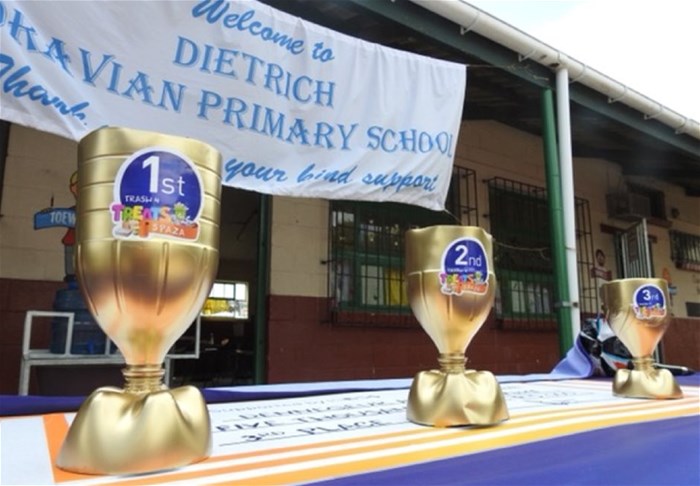The Extended Producer Responsibility (EPR) legislation, which recently came into effect, focuses on ensuring that the value of waste is never lost. It helps divert materials from landfills, requiring that these materials be recycled and reused instead. To help maintain the value of waste, primary school learners from twenty local schools in the Western Cape recycled 25,393.38kg of these materials during the INEOS Trash 4 Treats project this year. The competition, held from April to September 2021, culminated in an award ceremony last Friday at the winning schools.

Trophies made from recycled plastic
The Ineos Trash 4 Treats project teaches primary school learners the importance of recycling at a tender age to help them build positive habits for the long term. In return for the most recyclable waste collected, learners are rewarded with treats, and schools stand a chance of winning their share of R100,000 in prize money to upgrade their facilities.
This year, following a successful pilot with ten schools in 2019, Ineos expanded its project to include ten more schools. “Investing in our future means investing in our children,” says Caroline Hughes, project manager at Ineos. “Through this competition, we want to demonstrate to young learners from low-income households that recyclable waste has value. In addition, we strive to encourage behaviour change through a combination of education, recognition and reward,” she adds.
Mzamomhle Primary School, in Philippi, won first place for recycling 3,769kg during the competition. In second place, having recycled 2,164.8kg, was Symphony Primary in Belhar, and Dietrich Mor Primary in Philippi came in third place for recycling 1,453.6kg.
“We’ve noticed a big difference in our learners since we started the Trash 4 Treats project,” says Mr Welile Ngonzo, principal of Mzamomhle Primary School. “When the learners start receiving rewards, they are driven to recycle more and can share their learnings with family and friends. It has been wonderful to witness children take an active interest in caring for their environment,” he adds.
“Many of the children who partook in the competition didn’t know why litter was a problem,” says Hughes. “But the hope is that now, having seen the financial and environmental benefits of managing their waste, these children will continue to keep their neighbourhoods tidy. The waste that they helped us recycle this year would have otherwise ended up in our already full landfills,” she adds.
Keeping the environment clean is a learned behaviour that benefits us all. Recycling mascot, Trashy was present at the awards ceremony and, together with a magician, reminded the children what can and cannot be recycled. The project pairs schools with local waste collectors who buy back the waste collected on-site, creating a mutually beneficial relationship that benefits the community.
“All the schools plan to continue their involvement with the local recycling collectors, and based on the successes already achieved, we are keen to find South African partners to help us expand our impact even further,” says Hughes. “The project offers organisations an opportunity to become compliant with the Extended Producer Responsibility legislation, which came into effect earlier this year, and allows them to help inspire responsible consumers of the future,” she concludes.
For more information on the project or details on how to get involved, visit https://trashfortreats.com or contact Shilpa on +27 11 447 0427 or az.oc.doogtod@aplihs.
Issued by cause marketing agency, dotGood.
About Ineos
Ineos (www.ineos.com) is one of the world’s largest manufacturing companies operating across 194 sites in 29 countries around the world. Their products make a significant contribution to saving lives, improving health and enhancing the living standards of people around the world.


































